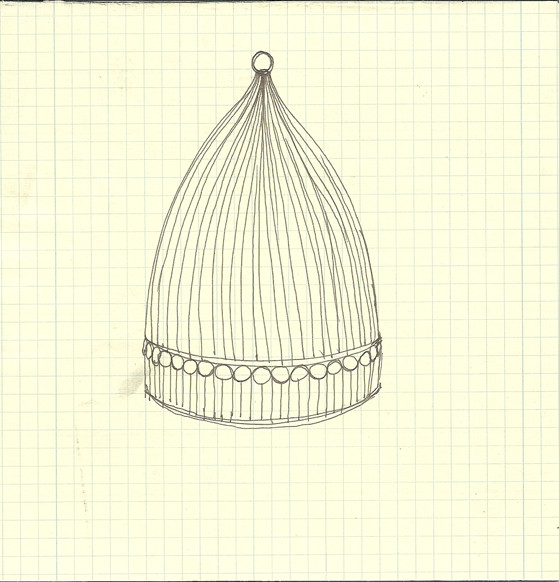'Back of'
Index, bibliography, catalog, list

This post explores the poem as index, bibliography, catalog, or otherwise arranged list. I want to consider the ways each piece overflows, suggesting threads that the listener might follow or complicating the idea of order under the guise of an ordering structure. I want to pay attention to the ways these recordings open up into the works of other writers and artists in addition to reflecting back upon the concerns of their respective authors. I am interested in what the arrangement and interplay between selected materials suggests as well as how indexical forms often point to the hidden, the unacknowledged, the invisible, the partial. The poems in this playlist investigate what is “back of” a poem, a poet’s life, a place, or a sound.
I will begin with a recent piece by Andrew Joron recorded this January at the Dikeou Gallery in Denver. As Joron explains, the poem was assembled by selecting sentences and phrases that began with the phrase “back of” from Robert Duncan’s H.D. Book while Joron was indexing it for publication. Listen to Back Of. Joron uses Duncan’s recurrent phrase to create an evocative catalog of Duncan’s responses to the life, work, and world of H.D. Each selection acts as a different vantage point into a dense network of individual experiences, social formations, and historical conditions. Listen to H.D. reading from Helen in Egypt. You can hear many recordings of Robert Duncan on his PennSound page, including a 1986 Seminar on H.D.
Rachel Blau DuPlessis’s 1988 reading at Woodland Pattern Books in Milwaukee includes this excerpt from her critical work H.D.: The Career of That Struggle. The piece sets H.D.’s work and life against a larger backdrop of issues facing women writers: “It was the struggle not to be reduced, to be neither muse, nor poetess. It is the struggle. The career of the woman poet is the career of that struggle.” Each part of DuPlessis’s list, such as “events excluded” and “the ways she is impeded” gives visibility to often unacknowledged conditions surrounding composition and reception facing women writers. DuPlessis further addresses this sense that “All must be remade” in her discussion of Drafts later on in the same reading. Listen to DuPlessis read from Draft 48: Being Astonished at KWH in 2000.
Ann Lauterbach’s Acrostic Poem (Barbara Guest) uses language selected from Guest’s book Rocks on a Platter. Because the book can be read as an annotative work itself, Lauterbach’s poem functions as a reading of Guest’s own readings. Rather than merely invoking or celebrating Guest, Lauterbach’s piece also pays attention to the ways Guest pays attention to language. Check out this review by Ramez Qureshi of Rocks on a Platter in issue #10 of Jacket. See also Barbara Guest’s PennSound page.
Tonya Foster’s poem New Orleans Bibliography, recorded in 2002 at the Segue Series, takes the form of an abecedarian. This poem sets up a series of readings of a particular place, a sampling of language orbiting New Orleans. It assembles a sequence of partial views, each suggestive of a more embodied story or larger context alive behind it. In this brief film, you can watch Foster answer Charles Bernstein’s question about things she misses most about New Orleans since Hurricane Katrina.
Fred Moten’s poem alexander weheliye, lygia clark, ed roberson, (link to text of poem) from his book B Jenkins enacts a discrepant engagement between a scholar, a Brazilian visual artist, and a poet, but it never settles into easily identifiable ekphrasis or portraiture. In the interview with Charles Rowell that closes the book, Moten talks about his relationship to process, sound, and subject matter: “Writing a poem has become for me, at least in part, an attempt to find out some things and to try to work through some things intellectually, emotionally, and musically. I’m trying to find out some things, get at some things, and consider some things, while at the same time trying to make some things. That process is a struggle toward language that tries to struggle toward things; it is movement in preparation.” Although the poem as “struggle toward language” can be read on its own by feeling through its atmospheres and musics, the piece enters into a conversation with the figures mentioned in oblique ways. I recommend checking out Alexander Weheliye’s website (as well as his excellent book Phonographies: Grooves in Sonic Afro-Modernity), this video of a folding sculpture by Lygia Clark as well as some of her writings, and this recording of Ed Roberson reading his poem Sequoia Sempervirens at the Segue Series in 2006.
The stark, pared down list of Alice Notley’s The Ten Best Issues of Comic Books is deceptively rich when the titles of the comic books are considered independently of their storylines. Far from random, the list, without any external commentary from Notley, presents themes of secretiveness, paranoia, and control in titles such as: “Defenders #125” “Phoenix: The Untold Story” "What If?" “New Mutants#2” “Secret Wars #1”.
Tim Dlugos’s 1978 reading of his poem Great Books of the 1950s is comprised of summaries of easily recognizable books. By addressing a “you” as the protagonist or author of each of these books and maintaining an ironic distance from the materials, Dlugos highlights some of their absurd qualities. By the way, A Fast Life: The Collected Poems of Tim Dlugos is just out from Nightboat Books.
Notes on PennSound